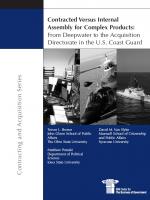
Contracted Versus Internal Assembly for Complex Products: From Deepwater to the Acquisition Directorate in the U.S. Coast Guard

It is important to emphasize that the authors have not attempted to assess or evaluate the transition or Project Deepwater itself. Instead, the report focuses on providing lessons learned from the transition and offers three recommendations for contract management staff, agency executives, and congressional and executive-level policy makers.
A key message from the report is that the federal government will need to enhance its contracting capabilities (including the number of personnel working on acquisition) to manage the “assembly” of complex products. In the case of the U. S. Coast Guard, the last several years have been spent on enhancing both the capability and the size of CG-9, the Coast Guard Acquisition Directorate. One lesson from the Coast Guard experience is that federal agencies cannot easily turn the “switch” overnight from an external LSI to moving the LSI role in-house. The Coast Guard began the transition to CG-9 serving as the LSI in 2007, and it will not be completed until 2011. All new contracts for Deepwater assets, however, are now being awarded by CG-9.
The Coast Guard’s Project Deepwater is still a work in progress, nearly 10 years after recognition by the Coast Guard that it needed an integrated procurement program to procure its future assets (helicopters, ships, information technology) and armaments. There is clearly much that the rest of the federal government can learn from the Coast Guard experience. In future years, an increased number of agencies will face the challenge of deciding whether to undertake “contracted versus internal assembly” for complex products. The report also concludes that the federal government now needs a new set of policies and tools to enable it to more effectively procure complex products.
It is clear that the federal government will continue to need to procure complex products (such as large information technology projects) in the years ahead. Lessons from the United States Coast Guard Deepwater Project, both positive and negative, can clearly be helpful to other agencies. We hope that this study will be useful and informative to leaders in both the executive and legislative branches of government as they wrestle with the challenge of acquiring complex products.



